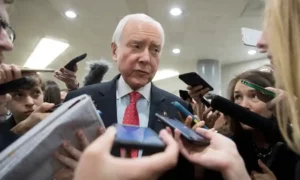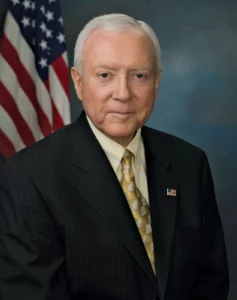Orrin Hatch (March 22, 1934 – April 23, 2022) was a United States senator from Utah from 1977 to 2019. Hatch was the longest-serving Republican senator in history, with a 42-year tenure in the Senate. Hatch was a devout member of The Church of Jesus Christ of Latter-day Saints for the majority of his life (LDS Church).

Orrin Hatch is an American actor and director.
From 1981 to 1987, Hatch served as the chairman of the Senate Committee on Health, Education, Labor, and Pensions. From 1995 to 2001 and 2003 to 2005, he was the chair of the Senate Judiciary Committee. He became president pro tempore of the Senate on January 3, 2015, after the 114th United States Congress was sworn in. From 2015 to 2019, he served as the chairman of the Senate Finance Committee, where he oversaw the passage of the Tax Cuts and Jobs Act of 2017.
Read More : The Controversy Surrounding The Springfield Armory !
Orrin Hatch, Utah’s longest-serving Republican senator, died Saturday at the age of 88.
His death was announced by his foundation in a statement that did not specify a cause of death.
On most economic and social issues, he was a staunch conservative, but he worked with Democrats on issues ranging from stem cell research to disability rights to expanding children’s health insurance on several occasions during his long career. He also made cross-partisan friendships, most notably with the late Edward Kennedy.

Hatch also fought for conservative causes like abortion restrictions and shaped the US Supreme Court, including defending Justice Clarence Thomas during his confirmation hearings against sexual harassment allegations.
.Read More : Boston’s North End Opens Its Outdoor Dining Space After a Fee Controversy !
Senator Orrin Hatch from Utah is remembered.
Earlier today on GTU – Former Utah Senator Orrin Hatch, the country’s longest-serving Republican senator, was a good friend of Good Things Utah and someone we will all miss and remember fondly. On Saturday, he died at the age of 88 in Salt Lake City. Hatch served in the Senate for 42 years, from 1977 to 2019. His death was confirmed by the Hatch Foundation in a statement that did not specify the cause of death. “Orrin. Hatch was everything a United States Senator should be: a man of wisdom, kindness, character, and compassion,” A. Scott Anderson, chairman of the Hatch Foundation, said. “He embodied the principles of comity and compromise better than anyone else, exemplifying a generation of lawmakers brought upon them.” Orrin Hatch helped show us a better way in a divided country by forging meaningful friendships on both sides of the political aisle.”

It’s also worth noting that we’re discussing teenagers. Adolescence in the United States is changing rapidly. Binge drinking, drunken driving, teen pregnancy, and smoking were the most serious public health threats facing teenagers in the United States three decades ago. These have dropped precipitously since then, and have been replaced by a new public health concern: rising rates of mental illness. In 2019, 13% of unfollow adolescents said they had experienced a major depressive episode, up from 7% in 2007. Anxiety, mood disorders, and self-harm were all common reasons for children and adolescents to visit the emergency room during that time. According to the Centers for Disease Control and Prevention, suicide rates among people aged 10 to 24 years old increased by nearly 60% between 2000 and 2007. The COVID-19 pandemic exacerbated, but did not cause, a decline in mental health among teenagers that cut across racial and ethnic groups, urban and rural areas, and socioeconomic classes. The US surgeon general warned of a “devastating” mental health crisis among adolescents in a rare public statement in December.
.Read More : After The Masters Controversy, The Son Of Gary Player Discusses Augusta National’s Ban !
History
Following the September 11 attacks, the Bush administration proposed legislation to Congress that would give the government more authority to monitor, investigate, and detain suspected terrorists. On October 11, the Senate passed the Uniting and Strengthening America (USA) Act (96–1). On October 12,

the House of Representatives passed the Uniting and Strengthening America (USA) Act, which included much of the text of the Senate’s USA Act (337–79). The USA PATRIOT Act, which was introduced on October 23 and passed the next day (357–66), was a compromise bill. On October 25, the Senate unanimously passed the House bill (98–1) without amendment, and Bush signed it into law the next day.

